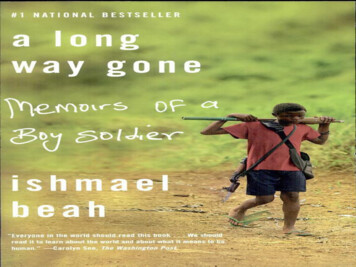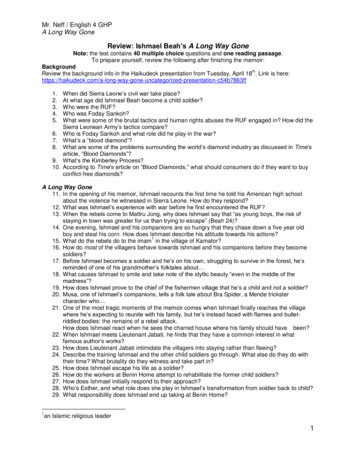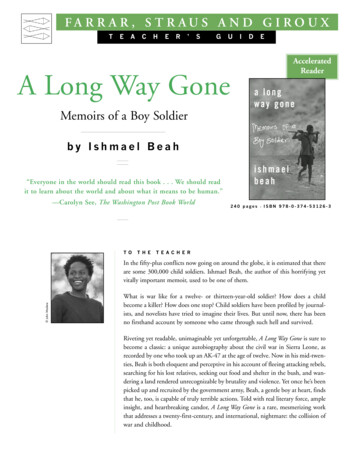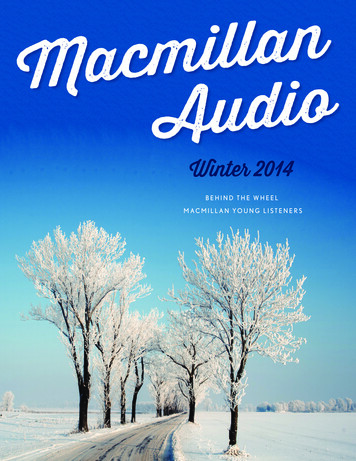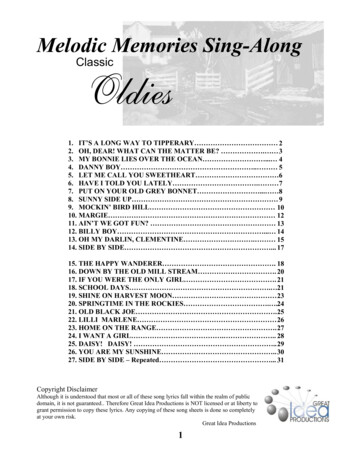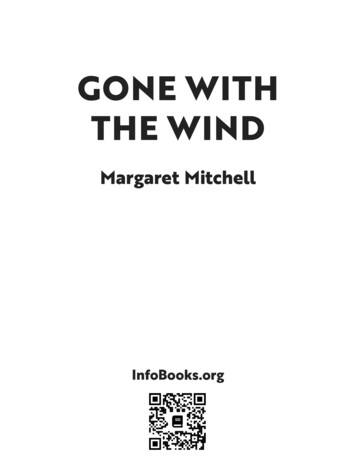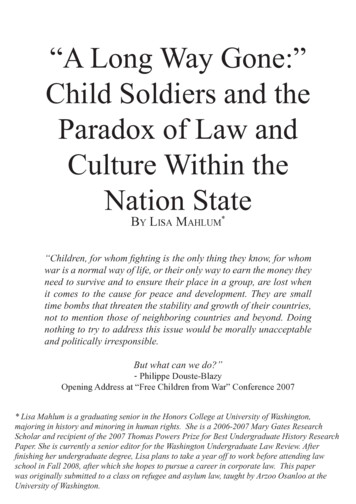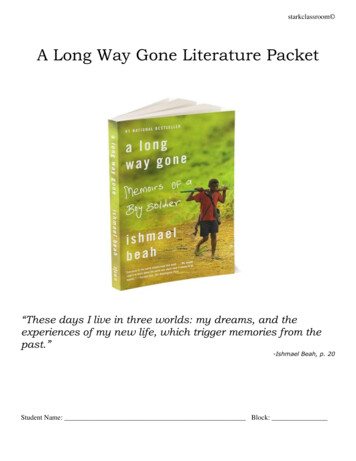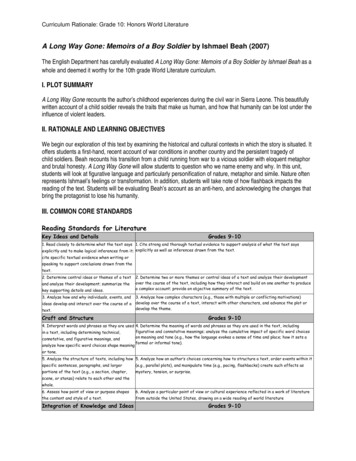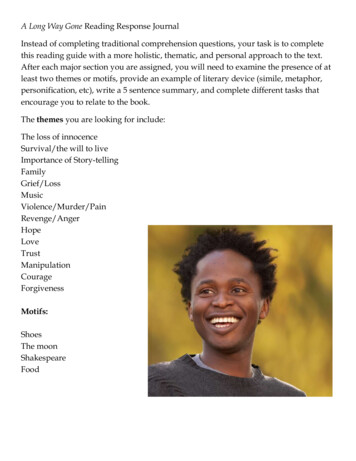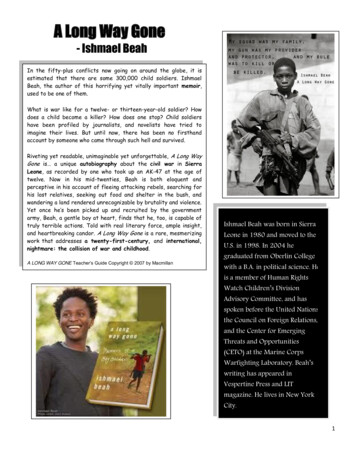
Transcription
A Long Way Gone- Ishmael BeahIn the fifty-plus conflicts now going on around the globe, it isestimated that there are some 300,000 child soldiers. IshmaelBeah, the author of this horrifying yet vitally important memoir,used to be one of them.What is war like for a twelve- or thirteen-year-old soldier? Howdoes a child become a killer? How does one stop? Child soldiershave been profiled by journalists, and novelists have tried toimagine their lives. But until now, there has been no firsthandaccount by someone who came through such hell and survived.Riveting yet readable, unimaginable yet unforgettable, A Long WayGone is a unique autobiography about the civil war in SierraLeone, as recorded by one who took up an AK-47 at the age oftwelve. Now in his mid-twenties, Beah is both eloquent andperceptive in his account of fleeing attacking rebels, searching forhis lost relatives, seeking out food and shelter in the bush, andwandering a land rendered unrecognizable by brutality and violence.Yet once he’s been picked up and recruited by the governmentarmy, Beah, a gentle boy at heart, finds that he, too, is capable oftruly terrible actions. Told with real literary force, ample insight,and heartbreaking candor. A Long Way Gone is a rare, mesmerizingwork that addresses a twenty-first-century, and international,nightmare: the collision of war and childhood.A LONG WAY GONE Teacher’s Guide Copyright 2007 by MacmillanIshmael Beah was born in SierraLeone in 1980 and moved to theU.S. in 1998. In 2004 hegraduated from Oberlin Collegewith a B.A. in political science. Heis a member of Human RightsWatch Children’s DivisionAdvisory Committee, and hasspoken before the United Nations,the Council on Foreign Relations,and the Center for EmergingThreats and Opportunities(CETO) at the Marine CorpsWarfighting Laboratory. Beah’swriting has appeared inVespertine Press and LITmagazine. He lives in New YorkCity.1
Terms to Define and Discuss1. crapes (p. 7)24. gari (p. 91)2. kamor (p. 8)25. wahlee (p. 98)3. lorry (p. 10)26. brown brown (p. 121)4. cassava (p. 17)27. tafe (p. 137)5. RUF (p. 21)28. kalo kalo (p. 150)6. palampo (p. 23)29. repatriate (p. 171)7. RPGs (p. 24)30. kule (p. 177)8. sleepers (p. 27)31. sackie thomboi (p. 181)9. imam (p. 44)32. ablution (p. 182)10. sura (p. 44)33. raggamorphy (p. 183)11. waleh (p. 51)34. upline (p. 184)12. Nessie (p. 51)35. poda podas (p. 185)13. Temne (p. 55)36. SLPP (p. 188)14. Mende (p. 55)37. groundnut (p. 188)15. soukous (p. 59)38. CAW (p. 188)16. jerry cans (p. 59)39. United Nations First17. Sherbro (p. 63)40. International Children’s18. carseloi (p. 71)41. Parliament (p. 195)19. spirogyra (p. 73)42. NGOs (p. 196)20. pestles (p. 76)43. UN ECOSOC (p. 199)21. lappei (p. 76)44. “Sobels” (p. 203)22. leweh (p. 76)45. G3 (p. 207)23. Ngor (p. 91)46. Conakry (p. 209)2
Reading and Written Response Due Dates:Chpts. 1-7 (44 pgs.):Tuesday, April 24thChpts. 8-14 (76 pgs.):Monday, April 30thChpts. 15-21 (92 pgs.): Monday, May 7thReading and Understanding the Book: As you read the book, you will demonstrate comprehension,analysis, and connection through a series of written responses in your writer’s notebook. For each set of readings,complete 2 of the 5 writing prompts. Written response requirements: Labeled: Chapters and Written Response #1 full pageAll quoted text must include page #.Chapters 1-7 Written Response Prompts:Written Responses 1:Watch this interview clip of his discovery of hip-hop: http://www.alongwaygone.com/hiphop.htmlConsider your early experiences with music. What were some of the first songs or artists that were meaningful toyou? Why? How were your experiences with music similar or different to Ishmael’s?Written Responses 2:As Chapter 2 begins, we flash forward to Ishmael’s new life in New York City. He describes a dream of pushing awheelbarrow. What is in the wheelbarrow and where is he pushing it? What does Ishmael mean when he says, “I amlooking at my own?” (19). How is flashback used in this book? Why would the author of a memoir use flashback?Written Response 3:By the end of Chapter 4 the boys have stolen food for the first time in order to survive. This is their first criminal act.Just a few days earlier they were innocently traveling to a talent show to perform their rap and dance routine. Listseveral events that have occurred since then to cause this sudden change in the boys’ moral code.Written Response 4:On page 37 Ishmael explains how traveling with a group of boys was a disadvantage. Why was this? How had thecivil war affected people’s reactions to strangers in general?Written Response 5:In Chapter 7, Ishmael describes his journey towards Bonthe. “For five days, I walked from dawn to dusk, nevercoming in contact with any human being." Think about your daily social interaction - family, friends at school, relatives,service people, team mates, and the many different people you come in contact with on a daily basis. Now close youreyes and imagine your days without ANY social interaction - scared, homeless, hungry, and lost. How did Ishmaelkeep his sanity during this time? What did he do? How would you deal with this kind of solitude? Would you do thesame things Ishmael did or would you behave differently? Do you think it would be easy or difficult?3
Chapters 8-14 Written Response Prompts:Written Response 1:Find an example of a simile on p. 49. What is it describing? How does this description enhance the reader’sunderstanding of this scenario? How is it an appropriate comparison?Written Response 2:The author uses foreshadowing on pg. 81 in the lines, "After Kanei stopped humming, the world became eerilysilent. The breeze and the clouds had stopped moving, the trees were still, as if they all awaited somethingunimaginable." What happens to the boy Saidu? What happened to his sisters at the outbreak of the war? Predictwhat will happen to the group of boys next.Written Response 3:Describe your personal thoughts and reactions as you read Chapter 11. How were you feeling as you read the firstfew pages of the chapter? How were you feeling as you read the last few pages?Written Response 4:The line “Cowards die many times before their death” from p. 104 is an allusion to Shakespeare’s Julius Caesar.Explain the significance of this quote at this point in the story.Written Response 5:Based on what you have read up to page 124, do you believe the government army that Ishmael fought for was reallyany different from the rebel army? On p. 124, Ishmael states, “The prisoner was simply another rebel who wasresponsible for the death of my family, as I had come to truly believe.” Moments later he slits the prisoner’s throat.What is ironic about his words and this situation?Chpts. 15-21 Written Response Prompts:Written Response 1:Describe your reaction to the violent and criminal behavior of the former child soldiers in the rehabilitation center. Areyou surprised by their behavior? Why or why not? Why do you think the workers at the center keep saying “it’s notyour fault”?Written Response 2:In Chapter 17, Ishmael describes the “first time [he’d] dreamt of [his] family since [he] started running away from thewar” (p.165). Describe the nightmare in your own words, explaining how it differs from the Ishmael’s other dreamsthat we’ve read about. How does this dream reflect his inner conflicts?Written Response 3:In Chapter 18, Ishmael listens to the Bob Marley song “Three Little Birds.” Watch and listen to the following video clip,then describe the mood or tone this song creates and how this relates to this part of the story.http://www.youtube.com/watch?v zaGUr6wzyT8&feature kpWritten Response 4:As he is leaving Benin House, Ishmael says farewell to his friend Alhaji, who salutes him while whispering, “Goodbye,squad leader.” “I couldn’t salute him in return, “Ishmael writes (p. 180). Why? Use quotes from the text in yourresponse.4
Written Response 5:Although New York City turns out to be much safer and more exciting than Ishmael had ever imagined, he isdisappointed by the food and shocked by the cold weather. Describe a time that you traveled to a new place or triedsomething new that was not what you expected it to be. What did you learn from this experience?5
A Long Way Gone - Ishmael Beah In the fifty and heartbreak U.S. in 1998. In 2004 he A LONG WAY GONE Watch Children's Division the Council on Foreign Relations, -plus conflicts now going on around the globe, it is estimated that there are some 300,000 child soldiers. Ishmael
